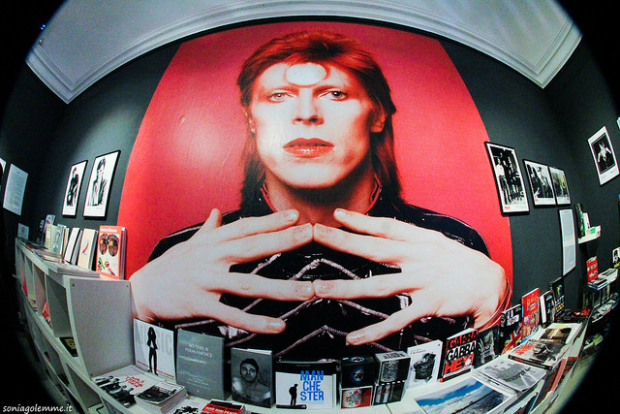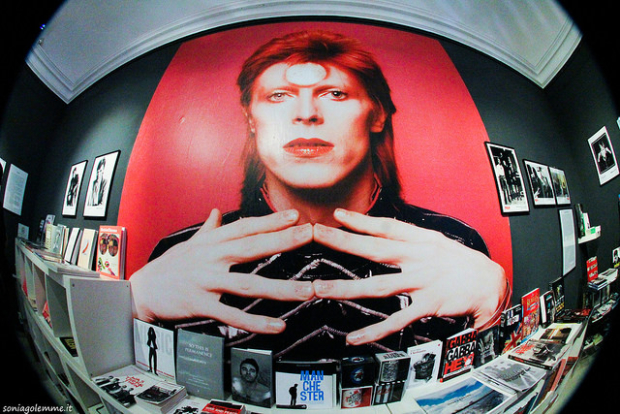Michael Coveney: David Bowie and fringe theatre

(© © Sonia Golemme/Flickr)
In all the tsunami of words about David Bowie this week, although due credit has been paid to the influence of mime maestro Lindsay Kemp, no-one has actually written the line, "I sat squashed next to Bowie at the Bush." Until now. I do. And I did, at Kemp’s extraordinary homage to Jean Genet, Flowers, at the Bush in early 1974.
Two years earlier, Kemp had staged the two legendary Ziggy Stardust concerts at the Rainbow, Finsbury Park, and the two of them, art school graduates and icons of the late 1960s, had long struck up a close creative collaboration. But while Kemp remained a niche and controversial dance artist at Sadler’s Wells and throughout Europe, Bowie exploded the gospel of explicit, sexual androgyny into pop and rock.
Kate Bush also saw that show at the Bush and immediately enrolled at Kemp’s classes and would turn to him often as her career progressed from a costume assistant to recording diva. On the whole, though, the fringe of the day was more obviously politicised through Brecht, and Brecht’s plays would also proliferate at the Bush and beyond until about twenty years ago. That strand was nostalgically evoked, for me, this week, with Phil Willmott’s smart and surprising revival of Brecht’s Fear and Misery of the Third Reich at the Union, charting the paranoia and ugliness of the Third Reich in the pre-war Berlin of the 1930s.
Bowie sat through Flowers without a flicker of emotion or reaction – our knees brushed once or twice, but no words were spoken – mesmerised by Kemp as he glided, white-faced and shrouded in a white veil, through prison fantasies of escape to the stirring sounds of Mozart’s Requiem and Piaf singing "La vie en rose," one of his accompanying male prisoner/whores delivering a hilariously tuneless rendition of "Somewhere Over the Rainbow."
That Rainbow was in Finsbury Park. But it gleams and glistens still in the performance of Jenna Russell in Grey Gardens at the Southwark Playhouse and in the gloriously knowing and sexy performances of Andrew Scott and David Dawson – both of whom come on like members of a Dirk Bogarde tribute band – in Richard Greenberg’s The Dazzle at the new Found 111 space next to Foyle’s on the Charing Cross Road.
Bowie sat through Flowers without a flicker of emotion or reaction – our knees brushed once or twice, but no words were spoken.
The origins of the London fringe can be traced right back to the Better Books shop on the very same drag (I use the term advisedly) started by Jim Haynes, founder of the Traverse in Edinburgh, in the mid-1960s, where the new art school performance artists like Mark Long and Jeff Nuttall of the People Show first emerged. The confluence of Bowie’s radical populism and the rock-style fringe never quite happened, but bubbled under and was quietly absorbed.
It’s interesting that both Grey Gardens and The Dazzle are about a couple of secretive fantasists who have gone to ground in an aura of decadence and dilapidation, as though the price of coming out – not just sexually, but socially as well – was obscurity, squalor and notoriety in death. Some of this atmosphere clung around the performances of Kemp who was never one – he’s still alive and living, as far as I know, in Rome – to shout his independence from the rooftops. Like Genet, he wallowed in the defiant underground.
Bowie, of course, went mainstream big time, and without losing any of the brilliance and plumage of his protest against his native suburbia or his divine decadence, while the glam rock he instigated was appropriated and peddled by lesser opportunistic breakaway artists. His and Kemp’s immediate influence could be best sampled at the Glasgow Citizens for a time in the 1970s and 1980s (when and where Brecht, too, was box office). But an influence it remains, as we have seen this week in such unlikely fringe venues as Southwark and back on the Charing Cross Road.
The big irony, perhaps, is that the audience for both shows is now predominantly middle-aged (the musical theatre crowd) and West End-y (seeking more congenial, reasonably priced and intimate an experience than the West End itself can offer). As for the overwhelming Bowie remembrance in the media, that might be to do with the age and vintage of the people running the print and television outlets. I’m already steeling myself for the reaction when, and if ever, the more incontestable, and very different, genius of Bob Dylan pops his clogs.











